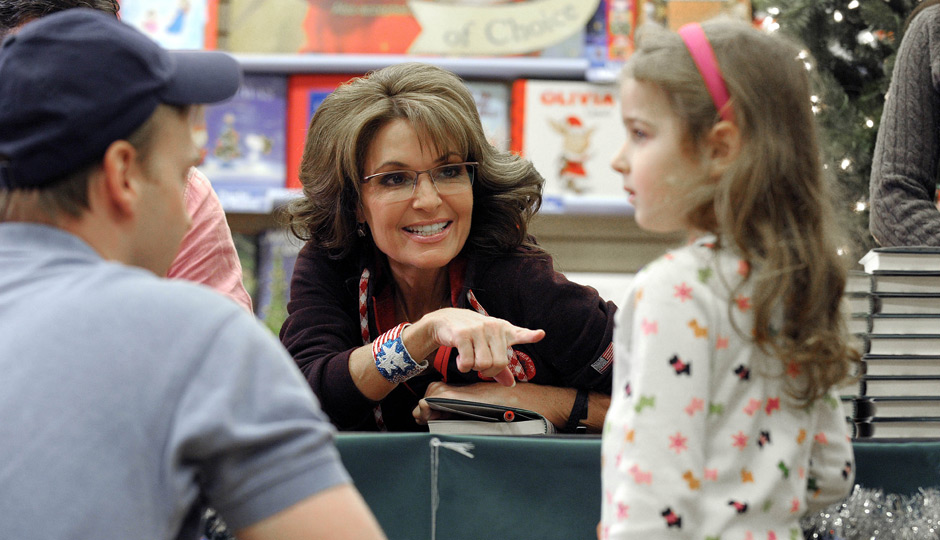Sarah Palin, Yawn, Wants to Protect Christmas

Sarah Palin gestures during a book signing, Tuesday, Nov. 12, 2013. (AP Photo/The Express-Times, Matt Smith)
In what may go down as one of the most transparent marketing gimmicks of all time, Sarah Palin traveled to Bethlehem, Pennsylvania, this week on a mission to save Christmas from the heathens. The former governor of Alaska and bête noire of the 2008 presidential election was joined by her perennially devoted husband, Todd, at the Barnes and Noble bookstore in Easton (which, if you’re keeping score, is not Bethlehem) on Tuesday night for the formal launch of her new book Good Tidings and Great Joy: Protecting the Heart of Christmas.
I’m still waiting for my copy of Good Tidings to arrive, but early reviews of the book describe it as a critique of the secularization, homogenization and consumerization of the holiday season, and, according to publisher HarperCollins, a challenge to the “politically correct Scrooges seeking to take Christ out of Christmas.”
Setting aside for a moment the irony of an author wearing an “It’s OK to wish me a Merry Christmas!” jumper railing against the commoditization of Christmas while simultaneously charging patrons the price of her Christmas-themed book for the honor of having a picture taken with her in front of a decorated tree, let’s just assume Palin’s passionate defense of her cause comes from a place unsullied by profit motive and see if there’s any meat to her argument.
As Palin sees it, thanks to lefty ACLU types who are waging an unmitigated war on the Baby Jesus, it’s becoming increasingly difficult for the majority of Americans who do so to publicly celebrate a holiday that is as ingrained in Western culture as Levi’s blue jeans and imperialism. Of course you wouldn’t know that from my neighborhood, where the Christmas lights go up the day after Thanksgiving and CVS has been stocking singing Santas since October. But if truth be told, Sarah Palin’s straw man, while slack around the middle, isn’t without a few shreds of stuffing.
It hardly qualifies as a “war,” but determined secularists are not completely innocent of some pretty outrageous attempts to scrub even the most innocuous faith-based displays from the public square.
Just last year administrators at a middle school in California canceled a production of Dickens’s A Christmas Carol — a play that has very little to do with the Christian holiday — because they thought it might offend Jewish students celebrating Hanukkah. A backlash forced the school’s hand, but not before an unsuccessful attempt to lobby the play’s publisher for a change of title. The year before, at another school in California, teachers were prohibited from displaying poinsettias in their classrooms; and Fort Worth Independent School District in Texas banned students from exchanging Christmas gifts or cards.
Even Philadelphia has played a cameo role in the Christmas kerfuffle. Back in 2010, the annual holiday flea market held outside City Hall (now in Love Park) was forced to temporarily remove the word “Christmas” from its name in response to complaints from “concerned” citizens. The name change only lasted a few days before Mayor Nutter intervened and re-inaugurated “Christmas Village.”
Rest assured, Christians aren’t the only ones under the gun. In 2011, a 16-year-old New Jersey boy was given the thankless task by his school of compiling a playlist for a holiday breakfast without any songs alluding to Christmas or Hanukkah. (Amazingly the student was able to find nine songs that met the criteria.) And a school in Greendale, Wisconsin, faced criticism after pulling a Hindu song popularized by Gandhi from its holiday concert.
It should be said, decisions like this are rarely made unilaterally, and are often propagated by a small but vocal vanguard of Establishment Clause purists who are extremely fearful of any perceived religious (in the U.S. this invariably means Christian) encroachment on public life. Frankly, they have good reason to be. For every atheist trying to ban Christmas carols from a public school play, there are thousands of professed Christians working tirelessly to implant their own beliefs onto public policy. If they’re not erecting roadblocks to women’s health care — or trying to prevent two loving people from tying the knot or adopting kids because they happen to be the same gender — they’re attempting to undermine decades of scientific research to make sure our kids are taught creationism in school.
Not for nothing, but I’d say that’s infinitely more intrusive than asking kids to wait until after school to unwrap presents. Still, it wouldn’t hurt for atheists to lighten up a little. When I was a kid attending public school outside of Philadelphia, we sang both the “Dreidel Song” and “Hark! the Herald Angels Sing” in music class and no one batted an eye. If you can get past the inflexible dogma — which, it should be said, the vast majority of religious practitioners in the U.S. have managed to do — there is nothing particularly nefarious about public displays of faith, without which Michelangelo’s Sistine Chapel or Handel’s “Messiah” would never have found expression.
For more than two centuries believers and non-believers in the U.S. coexisted in relative harmony until Evangelicals decided that was no longer a workable arrangement and launched the opening salvo in the culture wars. There are real fights to be waged to ensure religious extremists keep their hands out of our marriages and medical decisions, but waging them over poinsettias and Christmas trees is a poor choice for a battlefield.
Follow @cmoraff on Twitter.


